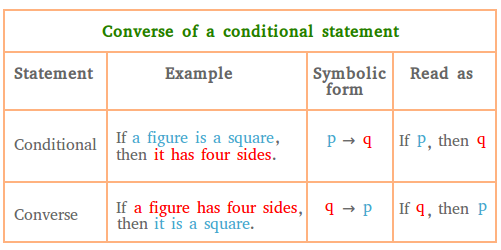Converse of a conditional statement
The converse of a conditional statement exchanges or switches the hypothesis and the conclusion. Study the figure at the end of the lesson carefully so that you can understand this concept clearly!
An example showing the converse of a conditional statement
What is the converse of the conditional statement below?
If you have a driver license, then you can drive a car by yourself.
Again, to find the converse of this conditional statement, just switch the hypothesis and the conclusion. The hypothesis is shown in blue and the conclusion is shown in red.
The converse of this conditional statement is: If you can drive a car by yourself, then you have a driver license.
In the lesson about conditional statement, we said that the symbol that we use to represent a conditional is p → q
The converse of p → q is q → p as illustrated in the figure in the beginning of this lesson.
More examples showing how to find the converse of conditional statements
Conditional : If the measure of an angle is 30 degrees, then the angle is acute.
Converse: If an angle is acute, then the measure of the angle is 30 degrees.
Conditional : If a figure is a rectangle, then it has four sides.
Converse : If a figure has four sides, then the figure is a rectangle.
Conditional : If a triangle is a right triangle, then the measure of one angle is 90 degrees.
Converse : If one angle of a triangle measures 90 degrees, then the triangle is a right triangle.
Did you not clearly understand the examples above? Did you not understand them at all? Here is a table summarizing the concept

Sometimes, it may be necessary to evaluate the truth value of a conditional statement and of its converse. For example, the truth value of the conditional statement in the figure above is true.
It is true because of the simple fact that a square always has four sides.
However, the truth value of the converse is false. A figure that has four sides may not be a square. The figure could be a rectangle, a parallelogram, or even a kite.
Check the math-dictionary.com site if you need more information on this topic. The math-dictionary.com also has a great figure illustrating the conditional and the converse of a conditional statement.